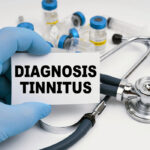Key Takeaways
- Research suggests vitamin B12 deficiency may be present in up to 47% of people with noise-induced hearing loss and tinnitus, indicating a potential connection worth exploring.
- Magnesium plays a critical role in nerve function and vascular health in the inner ear, with some studies showing improved tinnitus symptoms following supplementation.
- The combination of vitamin B12 and magnesium may offer synergistic benefits for tinnitus sufferers, especially those with underlying deficiencies in these nutrients.
- While supplements may help some individuals, they’re not a universal cure for tinnitus and should be used as part of a comprehensive approach to management.
- Always consult with a healthcare provider before starting any supplement regimen for tinnitus, as individual needs and underlying causes vary significantly.
That persistent ringing, buzzing, or whooshing sound in your ears can be more than just annoying—it can significantly impact your quality of life. If you’re among the millions suffering from tinnitus, you may be wondering if nutritional supplements like vitamin B12 and magnesium could offer relief. The answer isn’t straightforward, but emerging research gives us reason for cautious optimism.
Tinnitus affects approximately 15-20% of people worldwide, with varying degrees of severity. While conventional medicine often has limited solutions, natural approaches focusing on nutrient optimization have shown promising results for many tinnitus sufferers. Understanding how these specific nutrients affect your auditory system is the first step toward finding potential relief.
In this comprehensive review, we’ll examine the scientific evidence behind vitamin B12 and magnesium for tinnitus management, explore proper dosing, and help you determine if these supplements might be right for your situation.
The Truth About Tinnitus: What Those Ringing Ears Are Telling You
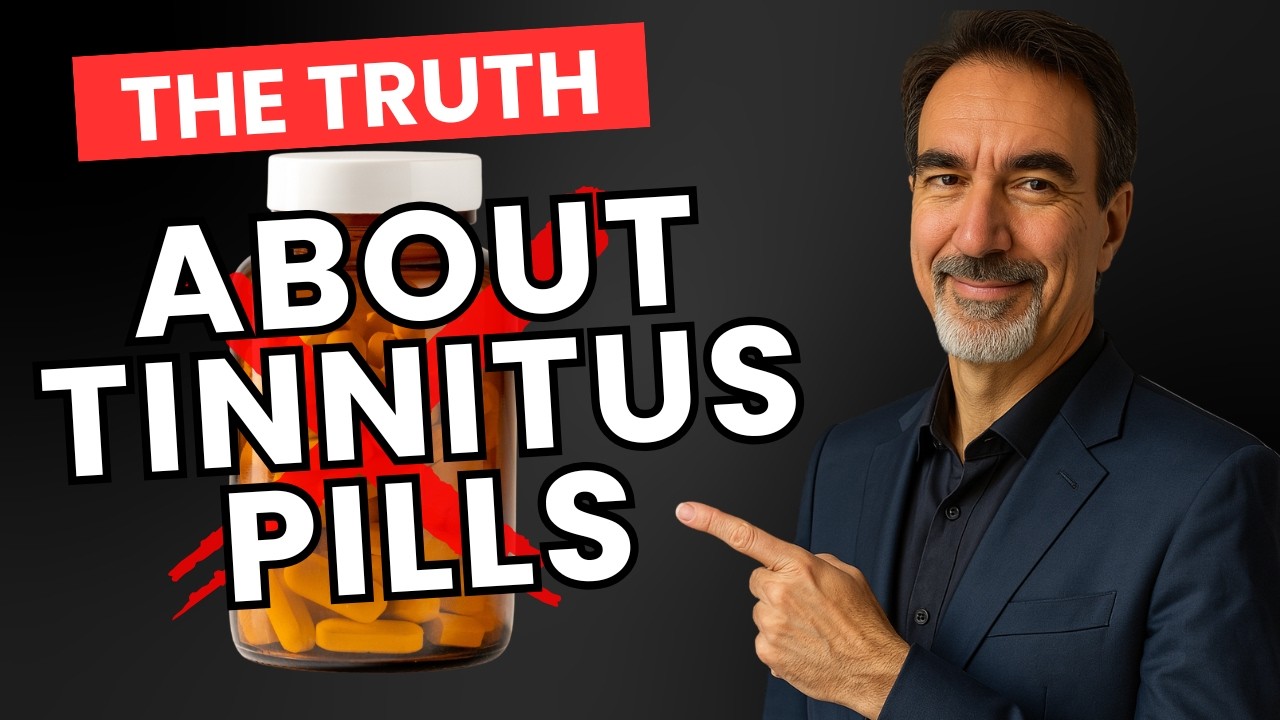
“Pill for Tinnitus Relief …” from www.youtube.com and used with no modifications.
Tinnitus isn’t actually a disease but a symptom—your body’s way of signaling that something is amiss within your auditory system. The phantom sounds you hear can result from numerous underlying causes: noise-induced hearing loss, age-related hearing changes, ear infections, circulatory disorders, or even certain medications. What many people don’t realize is that nutritional deficiencies can also play a significant role in either causing or exacerbating tinnitus symptoms.
Your auditory system requires specific nutrients to function optimally. Nerve cells need B vitamins for proper signaling, while blood vessels in your inner ear rely on minerals like magnesium for healthy circulation. When these nutrients are lacking, the intricate mechanisms of hearing can become compromised, potentially manifesting as tinnitus. This connection between nutrition and ear health explains why some people experience improvement in their symptoms when addressing specific deficiencies. To explore more about managing tinnitus, you can read about the role of supplements in managing this condition.
Before diving into specific supplements, it’s important to understand that tinnitus is highly individualized. What works for one person may not work for another, and identifying your personal triggers and deficiencies is crucial for developing an effective management strategy. For some, exploring options like the ReSound Relief app can be a part of this journey.
What Science Reveals About Vitamin B12 for Tinnitus Relief

“Vitamin B12 Deficiency Could Contribute …” from pcaudiology.ca and used with no modifications.
Vitamin B12 (cobalamin) plays a vital role in maintaining the health of your nervous system, including the auditory nerves that transmit sound signals to your brain. This essential nutrient helps in the formation of the protective myelin sheath around nerves and supports proper nerve function. When B12 levels are insufficient, nerve transmission can become impaired, potentially contributing to tinnitus symptoms. For more insights on managing tinnitus, explore how neuroplasticity impacts tinnitus.
How Vitamin B12 Deficiency Links to Nerve Function and Hearing
The relationship between B12 deficiency and tinnitus is particularly noteworthy. A landmark study by Shemesh et al. in 1993 found that 47% of patients with noise-induced hearing loss and tinnitus had vitamin B12 deficiency. By comparison, only 27% of those with hearing loss alone and just 19% of people without either condition showed B12 deficiency. This significant correlation suggests B12 status may influence your susceptibility to developing tinnitus, especially following noise exposure.
B12 deficiency can lead to demyelination—the breakdown of the protective coating around nerves—which can affect how auditory signals are processed. Additionally, B12 is involved in homocysteine metabolism, and elevated homocysteine levels can damage blood vessels, including those supplying the inner ear. The combined effect of compromised nerve function and vascular health creates the perfect storm for auditory dysfunction and tinnitus development.
Common Signs of B12 Deficiency
• Fatigue and weakness
• Pale or jaundiced skin
• Pins and needles sensations
• Changes in mobility
• Glossitis (swollen, red tongue)
• Mood changes and brain fog
• Vision problems
Current Research on B12 Supplementation for Tinnitus
More recent investigations have continued to build upon these early findings. A 2016 pilot study published in the Indian Journal of Otolaryngology and Head & Neck Surgery examined the therapeutic role of vitamin B12 in chronic tinnitus patients. The researchers found that patients with B12 deficiency showed significant improvement in tinnitus severity after receiving vitamin B12 therapy. Their tinnitus severity index scores and visual analog scale ratings both improved substantially, suggesting B12 supplementation may be beneficial for a subset of tinnitus sufferers.
Proper B12 Dosage and Best Food Sources
The recommended daily allowance (RDA) for vitamin B12 in adults is 2.4 micrograms, though therapeutic doses for tinnitus often range from 1,000 to 2,000 micrograms (1-2 mg) daily. This higher dosage is generally safe as B12 is water-soluble, meaning excess amounts are typically excreted rather than stored in the body. For those with confirmed deficiency, doctors may initially prescribe even higher doses or B12 injections to quickly restore optimal levels before transitioning to a maintenance dose.
Natural food sources of B12 include animal products like meat (especially liver), fish, eggs, and dairy. For vegetarians and vegans, nutritional yeast, fortified plant milks, and fortified cereals can provide some B12, though supplementation is often necessary to maintain adequate levels. When selecting a B12 supplement, methylcobalamin or hydroxycobalamin forms are generally preferred over cyanocobalamin, as they’re more bioavailable and better utilized by the body—particularly important for those with genetic variations affecting B12 metabolism.
Magnesium’s Role in Tinnitus Management
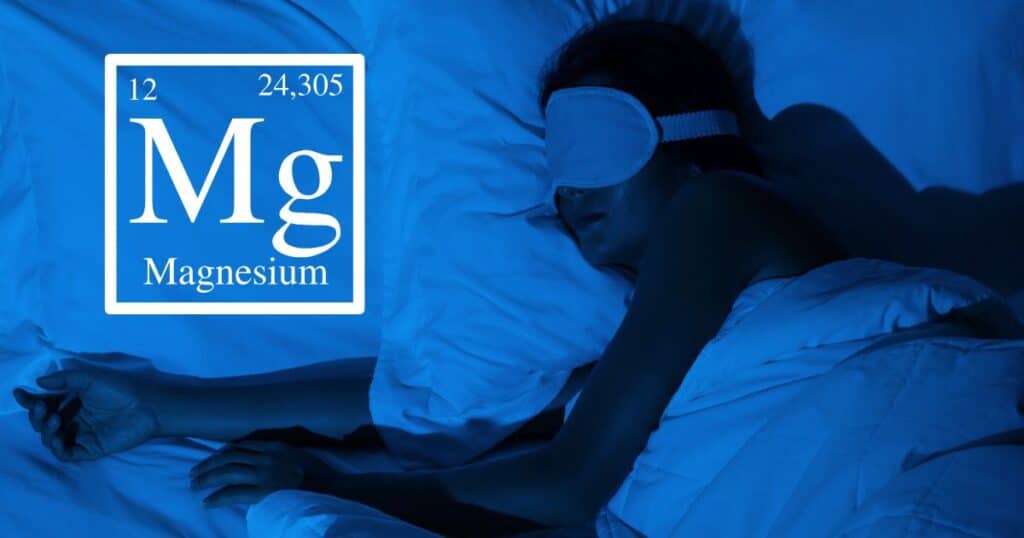
“Magnesium Tinnitus Therapy: Important …” from neuromedcare.com and used with no modifications.
Magnesium may be less frequently discussed than B12 in relation to tinnitus, but its role in auditory health is equally significant. This essential mineral serves as a natural calcium channel blocker in the body, helping regulate electrical impulses throughout the nervous system, including the auditory pathways. Magnesium deficiency is surprisingly common in modern diets, with some estimates suggesting up to 75% of Americans don’t meet the recommended daily intake.
How Magnesium Affects Your Auditory System
Inside your inner ear, magnesium helps maintain the proper balance of fluids and electrical charges necessary for normal hearing function. It plays a crucial role in protecting the delicate hair cells in your cochlea from damage due to loud noise exposure. Animal studies have demonstrated that magnesium supplementation before noise exposure can significantly reduce resulting hearing damage. This protective effect extends to the neural pathways that process sound, potentially reducing hyperexcitability that can manifest as tinnitus.
Magnesium also supports healthy blood flow to the inner ear by promoting vasodilation—the widening of blood vessels—which ensures adequate oxygen and nutrient delivery to auditory tissues. Many researchers believe that vascular factors contribute significantly to certain forms of tinnitus, making magnesium’s circulatory benefits particularly relevant. The mineral’s natural tension-reducing properties may provide additional benefits, as stress is a known trigger for tinnitus flare-ups in many sufferers.
Evidence Behind Magnesium for Tinnitus Symptom Relief
Research into magnesium’s effects on tinnitus has yielded promising results. A 2016 study published in The International Tinnitus Journal examined serum magnesium levels in 76 patients with severe tinnitus compared to 86 healthy controls. The researchers found significantly lower magnesium levels in the tinnitus group and noted that the severity of tinnitus symptoms correlated with the degree of magnesium deficiency. This suggests that correcting magnesium status could potentially improve symptoms for those with deficiency-related tinnitus. For more details, you can explore this Healthline article on magnesium for tinnitus.
Another clinical trial investigated magnesium supplementation in patients with noise-induced hearing loss and tinnitus. After 10 weeks of treatment, 46% of participants reported improvements in tinnitus symptoms—a significant finding considering the typically challenging nature of tinnitus treatment. While not every study has shown such positive outcomes, the evidence collectively suggests that magnesium supplementation may benefit a substantial subset of tinnitus sufferers, particularly those with noise-induced hearing damage or confirmed magnesium deficiency.
Recommended Magnesium Forms and Dosages
When selecting a magnesium supplement for tinnitus, the form matters significantly. Magnesium glycinate, magnesium threonate, and magnesium citrate tend to offer superior bioavailability compared to magnesium oxide. Magnesium threonate is particularly noteworthy as it more readily crosses the blood-brain barrier, potentially offering enhanced benefits for neurological symptoms like tinnitus. Typical therapeutic dosages range from 300-600mg daily, though individual needs may vary based on existing dietary intake, absorption capacity, and the severity of symptoms.
B12 and Magnesium Together: A Potential Winning Combination?
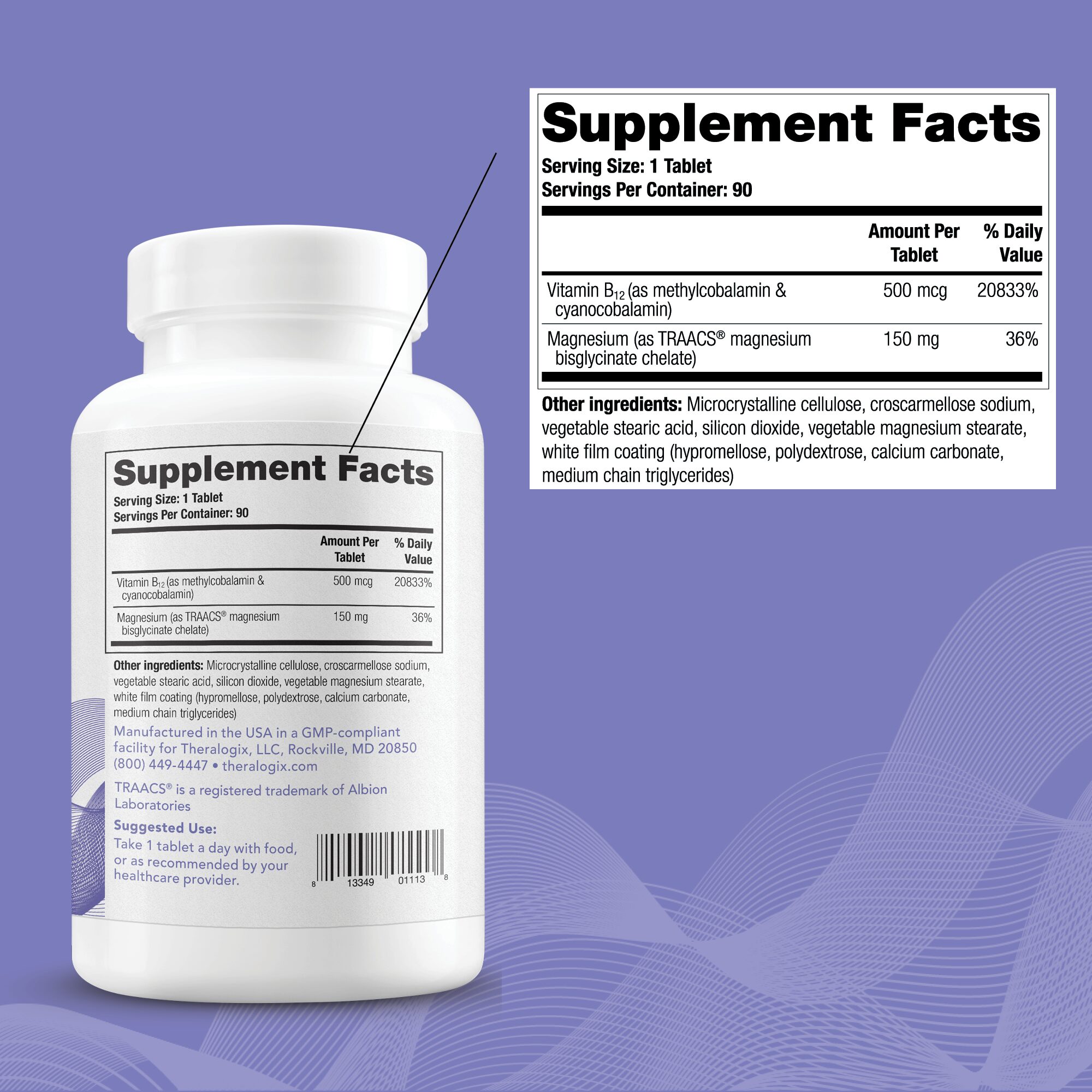
“Remplir® Nutritional Supplement …” from theralogix.com and used with no modifications.
While B12 and magnesium each show promise individually, their combined use may offer enhanced benefits for tinnitus sufferers. These nutrients work through different yet complementary mechanisms—B12 supporting proper nerve function and myelin maintenance, while magnesium regulates neural excitability and blood flow. This multi-faceted approach addresses several potential underlying factors that contribute to tinnitus simultaneously.
Many healthcare providers specializing in nutritional approaches to hearing health now recommend assessing both B12 and magnesium status in patients with persistent tinnitus. This comprehensive approach recognizes that nutritional deficiencies rarely occur in isolation and that addressing multiple imbalances often yields better results than focusing on a single nutrient. The synergistic relationship between these nutrients means they work better together than either would alone.
Synergistic Effects of Combined Supplementation
The interaction between vitamin B12 and magnesium creates a powerful synergy that may enhance their individual benefits for tinnitus sufferers. B12 supports proper nerve function and myelin maintenance, while magnesium regulates neural excitability and supports healthy blood flow to the inner ear. Together, they address multiple potential causes of tinnitus simultaneously—from nerve dysfunction to vascular insufficiency.
Research suggests that these nutrients work cooperatively at the cellular level. Magnesium is required for the proper activation of enzymes involved in B12 metabolism, while B12 supports energy production that helps cells utilize magnesium effectively. This biochemical partnership creates a foundation for improved auditory health that neither nutrient can accomplish alone. Additionally, both nutrients support mitochondrial function, helping the high-energy cells of your auditory system perform optimally.
Who Benefits Most from This Approach
While B12 and magnesium supplementation isn’t a universal cure for tinnitus, certain individuals are more likely to experience significant benefits. Those with confirmed deficiencies in either or both nutrients stand to gain the most from supplementation. Vegetarians and vegans are particularly susceptible to B12 deficiency, while those with digestive disorders, diabetes, or who take certain medications (including proton pump inhibitors and metformin) often struggle with both B12 and magnesium absorption.
Individuals with noise-induced tinnitus may respond especially well to this nutrient combination, as both B12 and magnesium have demonstrated protective effects against noise-related auditory damage. Those experiencing tinnitus alongside stress, anxiety, or sleep disturbances might also notice improvements, as magnesium has well-established calming properties that can break the cycle of stress-induced tinnitus amplification. Age-related tinnitus may also improve, particularly when it’s associated with the vascular changes common in older adults. For more information on managing tinnitus, you might find it helpful to read about how the Resound Relief app can help ease tinnitus symptoms.
Other Natural Approaches That Complement Vitamin Therapy
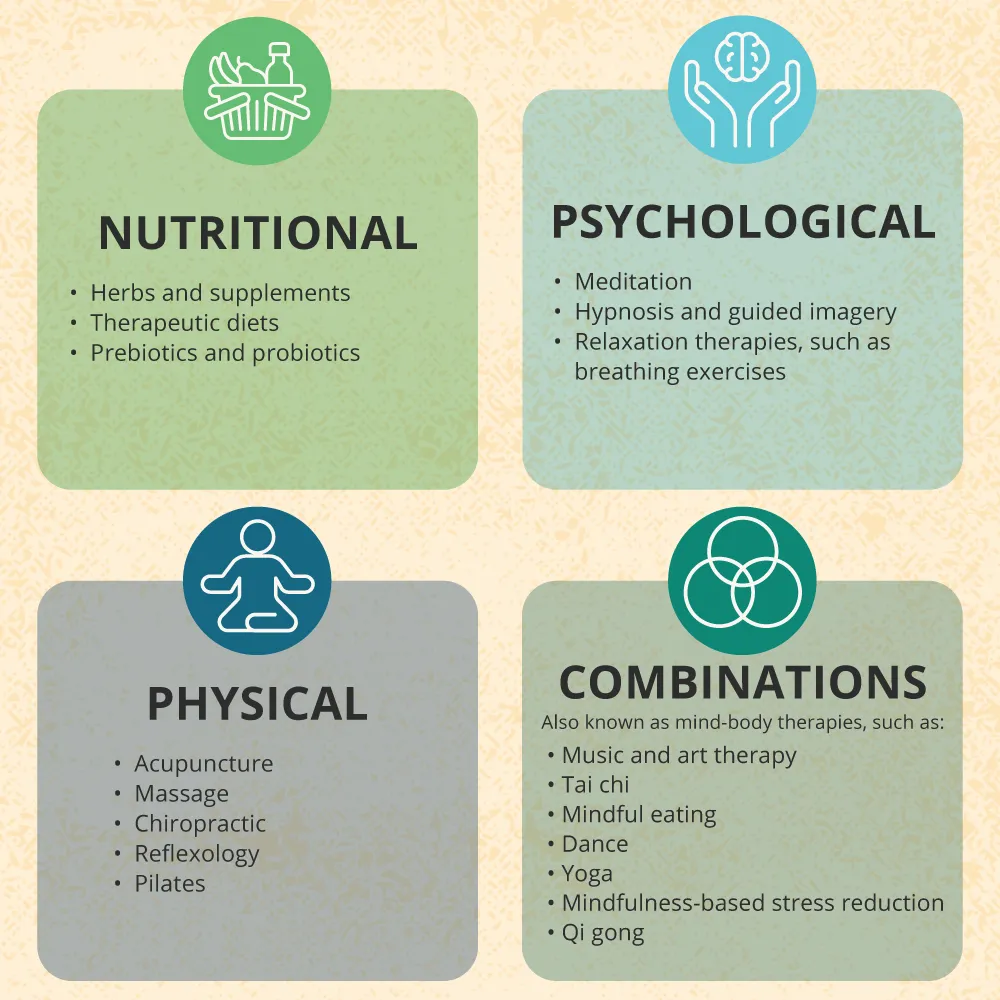
“Integrative, Alternative, and …” from www.everydayhealth.com and used with no modifications.
For optimal results, B12 and magnesium supplementation should be part of a comprehensive approach to tinnitus management. Additional nutrients that support auditory health include zinc, which plays a role in cochlear function, and antioxidants like vitamins C and E that protect against oxidative damage to the inner ear. Omega-3 fatty acids may also help by improving circulation and reducing inflammation throughout the auditory system.
Sound Therapy and Masking Techniques
Sound therapy works by either masking the tinnitus with pleasant background noise or retraining the brain to ignore the unwanted sounds. White noise machines, nature sound recordings, or specialized tinnitus masking devices can provide significant relief, especially when used consistently. Many smartphone apps now offer customizable sound environments specifically designed for tinnitus management that can complement your nutritional approach.
Progressive tinnitus retraining therapy (TRT) combines sound enrichment with counseling to help your brain habituate to tinnitus sounds, gradually reducing your awareness of and distress from them. This neuroplasticity-based approach works particularly well alongside nutritional interventions that support optimal nerve function. The combination addresses both the physical and perceptual aspects of tinnitus for more comprehensive relief.
Stress Reduction Practices
Stress is a known amplifier of tinnitus symptoms, creating a vicious cycle where tinnitus causes stress, and stress worsens tinnitus. Regular stress-reduction practices like meditation, deep breathing exercises, yoga, or tai chi can help break this cycle. These practices not only reduce the emotional impact of tinnitus but may actually lower the perceived volume and intrusiveness of the sounds themselves.
Mindfulness meditation has shown particular promise for tinnitus management in clinical studies. By practicing non-judgmental awareness of the present moment, you can learn to observe tinnitus sounds without the emotional reactivity that makes them distressing. This approach pairs excellently with magnesium supplementation, as both target the nervous system’s excitability and stress response.
Foods to Avoid That May Worsen Tinnitus
Just as certain nutrients can help tinnitus, some dietary elements may exacerbate symptoms. Common triggers include caffeine, alcohol, and high-sodium foods, all of which can affect blood flow to the inner ear. Aspartame and MSG are reported triggers for some individuals, possibly due to their excitatory effects on neural pathways. Monitoring your response to these substances through a food diary can help identify your personal triggers.
- Potential tinnitus triggers to limit: Caffeine, alcohol, excessive salt, aspartame, MSG, aged cheeses, processed meats
- Foods that support auditory health: Leafy greens (magnesium), salmon (omega-3s), nuts and seeds (zinc and magnesium), eggs (B12), whole grains (B vitamins), colorful fruits and vegetables (antioxidants)
When to Expect Results and When to See a Doctor

“5 Questions Your Doctor Wishes You’d Ask” from www.menshealth.com and used with no modifications.
Nutritional approaches to tinnitus management require patience and consistency. Unlike pharmaceutical interventions that may produce immediate effects, supplements typically work by gradually correcting underlying deficiencies and supporting cellular repair processes. Understanding realistic timelines helps manage expectations and ensures you give these approaches adequate time to demonstrate benefits.
Realistic Timelines for Supplement Effectiveness
For most people, noticeable improvements from B12 and magnesium supplementation begin after consistent use for 4-12 weeks. Initially, you might experience subtle changes such as shorter tinnitus episodes or slightly reduced volume. For those with significant deficiencies, improvements may come sooner, sometimes within 2-3 weeks of beginning supplementation. The full benefits typically develop over 3-6 months as tissues regenerate and neural pathways stabilize.
It’s important to track your symptoms systematically during this period. Using a tinnitus journal or a rating scale from 1-10 to document daily symptom severity can help identify gradual improvements that might otherwise go unnoticed. Note that progress is rarely linear—you may experience good days and bad days even as the overall trend moves toward improvement. This variability is normal and doesn’t indicate the approach isn’t working. For more information on managing tinnitus, you might find progressive tinnitus management to be a useful approach.
Warning Signs That Require Medical Attention
While exploring nutritional approaches to tinnitus, remain vigilant for signs that warrant immediate medical evaluation. Sudden onset of severe tinnitus, especially if accompanied by hearing loss, vertigo, or ear pain, requires prompt medical attention as it could indicate an acute condition like Ménière’s disease or acoustic neuroma. Pulsatile tinnitus—where the sound pulses in rhythm with your heartbeat—should always be evaluated by a physician as it may indicate vascular abnormalities requiring specific treatment.
The Bottom Line: Can B12 and Magnesium Help Your Tinnitus?
The evidence suggests that vitamin B12 and magnesium supplementation offers genuine potential for tinnitus relief, particularly for individuals with underlying deficiencies or noise-induced hearing damage. While not a universal cure, these nutrients address fundamental aspects of auditory health—from proper nerve function to cellular energy production and blood flow regulation—that can contribute to tinnitus symptoms when compromised. The greatest benefits typically occur when supplementation is part of a comprehensive approach that includes stress management, sound therapy, and attention to potential dietary triggers. For more insights, explore the role of sound therapy in tinnitus management.
For optimal results, work with a healthcare provider who can test your nutrient levels, recommend appropriate dosages, and monitor your progress. This personalized approach ensures you’re addressing your specific deficiencies and underlying causes rather than simply following a one-size-fits-all protocol. Remember that patience and consistency are key—nutritional approaches work by supporting your body’s natural healing mechanisms, which require time to produce noticeable improvements in complex conditions like tinnitus.
Frequently Asked Questions
The relationship between nutrition and tinnitus generates many questions from those seeking relief. Below are answers to some of the most common inquiries about vitamin B12, magnesium, and their potential role in tinnitus management. These insights can help you make more informed decisions about incorporating these nutrients into your tinnitus care plan.
While supplements can be valuable tools, they’re most effective when used as part of a comprehensive approach that addresses all aspects of auditory health—from proper nutrition to stress management and sound therapy techniques.
Can vitamin deficiency cause tinnitus to worsen suddenly?
Yes, rapid depletion of key nutrients like B12 and magnesium can potentially trigger or worsen tinnitus symptoms. This might occur during periods of increased stress, illness, or medication changes that affect nutrient absorption or utilization. B12 levels, in particular, can fluctuate based on factors like stomach acid production and intestinal health, potentially leading to neurological symptoms including tinnitus flare-ups.
Chronic deficiencies tend to produce gradual symptom progression, while sudden changes in nutrient status might correspond with more abrupt symptom changes. This relationship highlights the importance of consistent supplementation rather than intermittent use for those with confirmed deficiencies. Regular monitoring of nutrient levels can help prevent the dramatic fluctuations that might trigger sudden tinnitus escalation. For more on managing tinnitus, consider exploring the role of supplements in tinnitus management.
Is it safe to take B12 and magnesium supplements long-term?
Both vitamin B12 and magnesium are generally considered safe for long-term supplementation when taken at appropriate doses. B12 is water-soluble, with excess typically excreted through urine, making toxicity rare even at high doses. The most common side effects of B12 supplementation are mild and may include headache, nausea, or diarrhea, typically resolving as your body adjusts to the supplement.
Magnesium safety depends somewhat on the form used. Magnesium oxide and citrate can cause digestive discomfort or loose stools at higher doses, while magnesium glycinate and threonate are generally better tolerated. Most healthy adults can safely take 300-400mg of supplemental magnesium daily, though those with kidney disease should consult their physician before supplementing.
For both supplements, quality matters significantly. Choose products from reputable manufacturers that undergo third-party testing to ensure purity and accurate dosing. This minimizes the risk of contaminants or inconsistent potency that could affect both safety and efficacy during long-term use.
Why might some people respond better to these supplements than others?
Individual response to B12 and magnesium supplementation varies based on several factors, including baseline deficiency status, genetic variations affecting nutrient metabolism, the specific cause of tinnitus, and concurrent conditions or medications. Those with significant deficiencies typically experience more dramatic improvements than individuals with adequate levels. Genetic factors like MTHFR mutations can affect how efficiently your body utilizes B12, potentially influencing your response to standard supplements.
Can these supplements help with medication-induced tinnitus?
Medication-induced tinnitus, particularly from ototoxic drugs like certain antibiotics, chemotherapy agents, and high doses of aspirin, presents unique challenges. While B12 and magnesium haven’t been extensively studied specifically for drug-induced tinnitus, their neuroprotective properties may offer some benefits. Magnesium, in particular, has shown promise in animal studies for protecting against aminoglycoside antibiotic damage to the inner ear, suggesting potential protective effects.
The mechanism of medication-induced damage often involves oxidative stress to inner ear structures. Both B12 and magnesium support cellular energy production and antioxidant systems that may help counteract this damage. However, expectations should be realistic—while these nutrients may help mitigate damage or support recovery, they typically cannot completely reverse established medication-induced hearing damage.
Should I stop my current tinnitus treatments before trying vitamin therapy?
Nutritional supplementation should generally be viewed as complementary to, rather than a replacement for, conventional tinnitus treatments. If you’re currently using sound therapy, cognitive behavioral therapy, or prescribed medications for tinnitus management, continuing these approaches while adding appropriate supplements often yields the best results. The different treatment modalities can work synergistically, addressing multiple aspects of tinnitus simultaneously.
Always consult with your healthcare provider before making changes to your treatment regimen. This is particularly important if you’re taking prescription medications, as certain supplements can interact with drugs. Your provider can help you develop an integrated approach that safely combines conventional and nutritional therapies for optimal tinnitus management.
For personalized guidance on using supplements for tinnitus relief and comprehensive support for your auditory health journey, consider consulting with specialists who understand both conventional and integrative approaches to tinnitus management. Natural health experts can provide tailored recommendations based on your specific tinnitus profile and nutritional needs.












